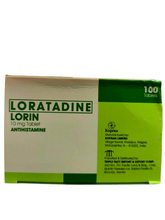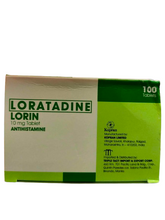Loratadine, commonly known by its brand name Claritin, is a non-sedating antihistamine medication used to treat allergy symptoms. It belongs to the class of drugs known as second-generation antihistamines. Loratadine works by blocking the effects of histamine, a substance in the body that is responsible for allergic symptoms.
Here are some key points about Loratadine:
-
Indications: Loratadine is primarily used to relieve symptoms associated with allergic conditions, such as hay fever (allergic rhinitis) and hives (urticaria). These symptoms may include sneezing, runny or itchy nose, itchy or watery eyes, and itching of the throat or skin.
-
Mechanism of Action: Loratadine works by selectively inhibiting the action of histamine on histamine H1 receptors. Unlike some older antihistamines, Loratadine is less likely to cause sedation because it has limited penetration into the central nervous system.
-
Dosage and Administration: The typical recommended dose for adults and children over the age of 6 is usually 10 mg once daily. However, the dosage may vary based on individual factors and the specific formulation of the medication. It is available in various forms, including tablets, chewable tablets, and syrup.
-
Side Effects: While Loratadine is generally well-tolerated, some individuals may experience side effects. Common side effects may include headache, dry mouth, fatigue, and gastrointestinal symptoms. Serious side effects are rare but should be reported to a healthcare professional.
-
Precautions: Individuals with certain medical conditions or taking specific medications should consult their healthcare provider before using Loratadine. It is important to disclose any pre-existing medical conditions or other medications being taken to ensure there are no potential interactions.



